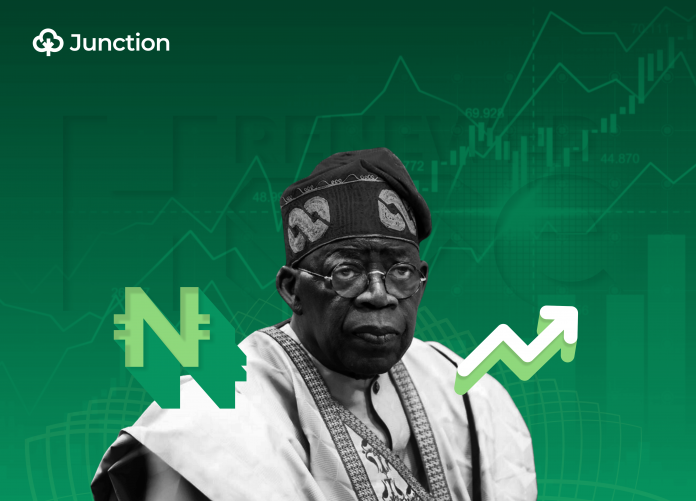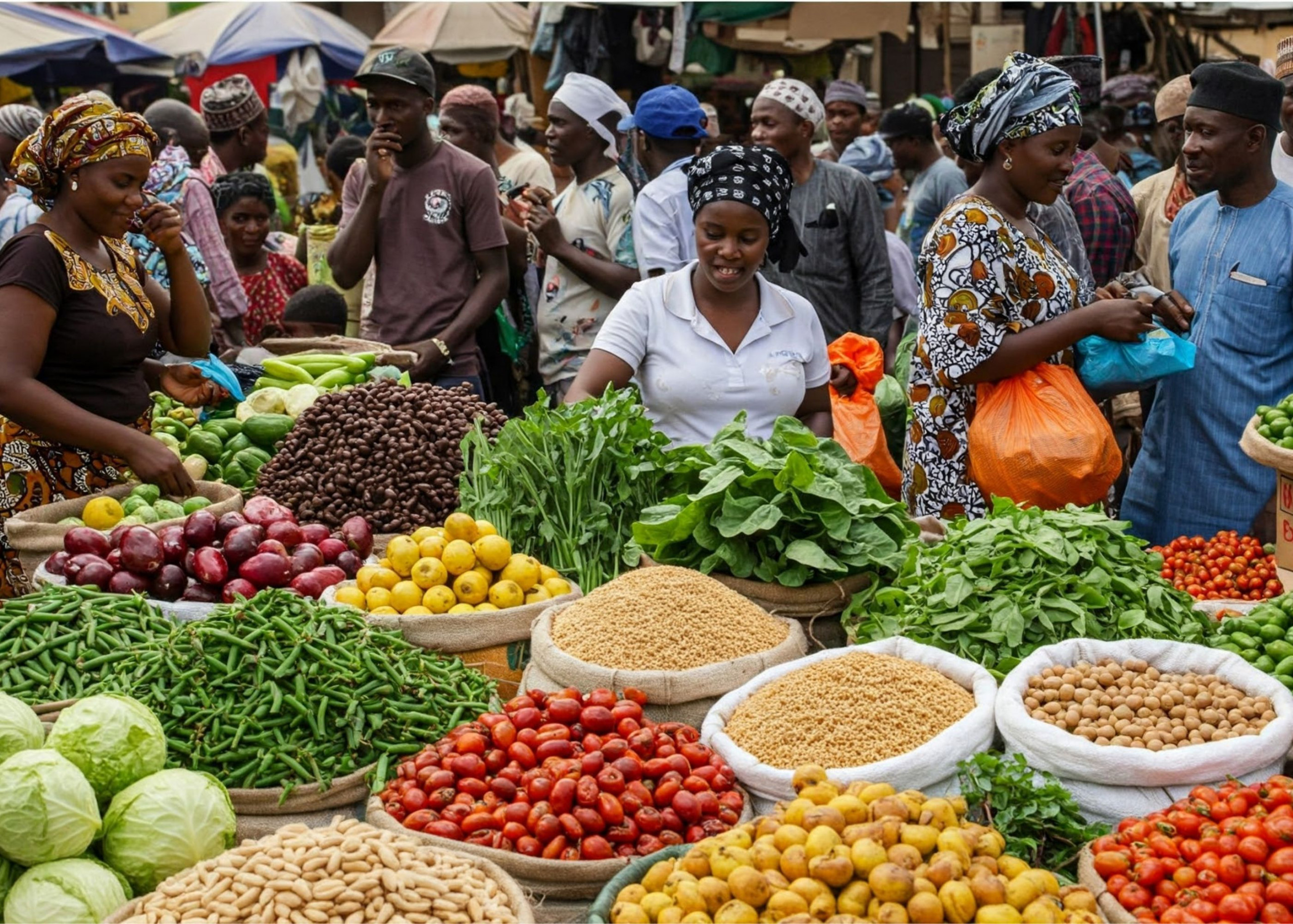Questions answered in this article:
– How has the removal of fuel subsidies by President Tinubu significantly contributed to more hardship in Nigeria?
– What effort is the government, through the CBN, playing in reducing this hardship?
– Is there any hope that the economic situation of Nigeria can be better?
“My immediate goal is to provide all Nigerians the basic needs of life at the minimum, including affordable housing, food security, quality primary education and healthcare for all, and a conducive and safe living environment. I will make eradicating poverty a significant priority of my administration.”
These words, excerpts from Bola Ahmed Tinubu’s manifesto, encapsulate the ambitious goals set by Nigeria’s now one-year-old president during the 2023 campaign season. A year ago, amidst challenges, including low voter turnout, and technological failures, Tinubu emerged victorious, assuming office as the President of Nigeria.
As he marks his first year in office, his anniversary highlights progress in economic reforms, foreign relations, social policies, and infrastructure development.
Record-high inflation enters the fray as fuel subsidy leaves
Tinubu’s tenure has been defined by significant challenges like record-high inflation and a volatile naira, as well as bold policies such as naira devaluation and the removal of fuel subsidies. Upon taking office, Nigeria faced high inflation driven by global energy prices and domestic instability. Over the past year, inflation rose to a record 33.69% in April 2024, up 11.28% from May 2023, with food inflation soaring to 40.53% from 22.41%, according to the National Bureau of Statistics (NBS). Tinubu’s policies, including Monetary Policy Rate (MPR) hikes, have significantly influenced these trends.

Admittedly, Nigeria has struggled with rising inflation for a decade, with steady increases in headline, food, and core inflation rates. However, there has been a recent sharp spike, especially in food inflation, coinciding with President Tinubu’s earlier mentioned economic measures. These policies have immediately increased living costs, particularly for essential food items. The chart above underscores the importance of evaluating Tinubu’s policies in addressing both the recent spike and the long-term inflationary pressures.
The removal of fuel subsidies remains one of Tinubu’s most controversial decisions. The policy intended to reduce government expenses and reallocate funds towards critical infrastructure and social service. However, the immediate consequence was a sharp increase in fuel prices, which rose by over 100% within weeks of the policy implementation, surging from an average of ₦238.11 per litre to ₦545.83 per litre.

The price hike had a ripple effect on the cost of transportation and goods, thereby intensifying inflationary pressures. This article will review the inflationary trends under Tinubu’s first year in office, highlighting the impacts and challenges of his economic policies.

In addition to the direct impact on overall inflation, the removal of fuel subsidies significantly influenced core inflation, which excludes the more volatile prices of food and energy. Core inflation rose as businesses faced increased transportation and production costs, which were passed on to consumers through higher prices for goods and services. This uptick in core inflation signals deeper, more persistent inflationary pressures within the economy. The elevated core inflation worsened the financial strain on households, reducing their purchasing power and disposable income.
A year of immediate policy impacts and economic shifts
While the annual inflation rate has been on a steady uptrend pre-Tinubu, the devil is in the details as the month-on-month (MoM) trend reveals something interesting. Analysing one year of inflation data before Tinubu’s presidency against one year after shows notable differences.

Before Tinubu, monthly headline inflation rates averaged around 1.6%, with food inflation at 1.8%. However, after Tinubu took office, the former surged to approximately 2.4%, with the latter increasing to 2.8%.
This spike in food inflation can also be largely attributed to a variety of factors, including seasonal variations in agricultural production, supply chain disruptions (due to the Israel-Hamas war which started in October 2023), hikes in fuel prices, as a result of policy measures such as the removal of fuel subsidies and adjustments in exchange rates. In the following sections, we’ll discuss these highlighted factors in detail, starting with the impact of fuel subsidy removal and its subsequent reversal.
Backtracking on fuel subsidy threatens hope for the future
While President Tinubu brazenly scrapped the long-standing fuel subsidy that had robbed the country of some generational wealth in May 2023, in less than a year, he quietly reinstated the policy, which is now expected to consume nearly half of the nation’s potential oil revenues in 2024. A recent International Monetary Fund (IMF) report revealed that this implicit subsidy, estimated at ₦8.43 trillion ($5.9 billion), would significantly affect the projected ₦17.7 trillion oil revenue. This about face undermines the initial goal of fiscal responsibility and places an even greater burden on the nation’s finances, jeopardising efforts to stabilise the economy and control inflation.
The initial removal saw PMS prices triple due to rising global oil prices and a weakening naira, leading to higher transport and production costs. It resulted in increased inflation and reduced disposable income, as evident in rising monthly and annual inflation rates. The long-term impact is even more concerning: heavy spending on fuel subsidies limits funds for crucial sectors like infrastructure, education, and healthcare, potentially slowing economic growth and productivity. Additionally, rising global oil prices and a weakening naira could still drive up fuel costs, leading to further inflation. While reinstating the fuel subsidy offers temporary relief, it comes at a significant economic cost.
Price stability efforts to curb inflation yields some results
The government is one of many players in managing inflation as the Central Bank of Nigeria (CBN) wields the powerful MPR tool. Under the leadership of Olayemi Cardoso, the bank has raised the rate four consecutive times, from 24.75% to 26.25%.
The primary objective behind this move was to prioritise price stability and rein in inflationary pressures. While year-on-year (YoY) inflation in April 2024 rose moderately, the MoM headline, food, and core inflation declined significantly by 229bps, 250bps, 220bps respectively. There was also a decline in MoM headline and food inflation in March 2024, suggesting that the recent tight monetary stance of the bank is beginning to yield the desired outcome. However, the Monetary Policy Committee (MPC) noted that the inflationary pressure continues to be driven by food inflation which constitutes over half the inflation basket.

While higher interest rates aim to curb inflation by reducing consumer spending and borrowing, they also risk slowing down economic growth. Recent data shows that Nigeria’s GDP growth slowed to 2.1% in Q1 ’24 versus 2.3% in Q1 ’23 and 3.2% in Q4 ’23, highlighting the potential economic impact of the tighter monetary policy.
The CBN’s strategy is more than just domestic factors. MPR hikes have a mixed impact on forex exchange (FX) flows. On one hand, they can attract foreign investors seeking higher returns on Nigerian investments like bonds and treasury bills. This increased demand for naira to purchase these assets can lead to an appreciation of the naira relative to other currencies. However, the potential slowdown in economic growth due to reduced borrowing can also discourage foreign investors. They may be hesitant to invest in an economy with slowing momentum.
Particularly, the CBN’s efforts to stabilise the naira through foreign exchange interventions have also had mixed results, with the naira experiencing volatility against major currencies.

Economic expert, Mr. Daniel Akeju, has faulted the hikes in MPR as an attempt to curb inflation and stabilise the economy. He said a balanced, holistic strategy combining supply-side interventions, enhanced security, economic diversification, and social safety nets would be more effective. He urged the CBN to focus on agriculture intervention, enhanced security, industrialisation, monetary and fiscal coordination, and targeted social programs. He added that the persistent hike in MPR has had severe socio-economic repercussions, such as rising food prices, increased poverty, escalating terrorism, and social safety nets, among others.
Hunger and poverty as purchasing power tumbles
Food prices surged significantly during Tinubu’s first year due to the removal of fuel subsidies, increased transportation and production costs, and currency devaluation. The cost of staple foods such as rice, maize, and yams has averaged a 20% to 30% increase, according to NBS data.

This has left individuals nationwide struggling to afford daily essentials, plunging more Nigerians into abject poverty.

The Tinubu administration has implemented several measures in response to rising food prices. These include launching the National Agricultural Development Fund (NADF), and the Green Imperative Programme to promote year-round farming and provide farmers with access to modern equipment and low-interest loans, ensuring a stable food supply. However, broader economic challenges such as high transportation costs, insecurity, and supply chain disruptions limited the impact of these efforts. Tinubu’s policy reforms heightened these challenges, with the removal of fuel subsidies contributing to increased transportation costs. Insecurity threatened farmers’ safety, hindering farm access, while geopolitical tensions disrupted supply chains. The Russia-Ukraine war, for instance, disrupted wheat trade, a major import for Nigeria’s staples, further intensifying inflationary pressures.
Is there any hope left to be renewed?
As President Tinubu marks his first year in office, Nigeria’s economic landscape remains challenging. Throughout this period, his administration has implemented bold policies to restructure the economy and reduce reliance on subsidies. However, they have led to significant short-term hardships, particularly in inflation and food pricing. The rising costs have strained household budgets, pushing more Nigerians into poverty, and questioning Tinubu’s initial promise of providing the basic needs for all Nigerians.
The coming years will be a critical test for President Tinubu’s bold economic reforms. Can they deliver sustained growth and improve the lives of Nigerians? A case study from Egypt offers some hope. Implementing similar reforms – subsidy cuts and currency devaluation – Egypt initially faced a challenging economic landscape. However, by staying committed to their policies and directing resources toward the underprivileged, they achieved stability and witnessed a rise in living standards. Nigeria’s path to success hinges on avoiding past missteps. Reinstating subsidies, increasing electricity costs, increased government spending, and ongoing security concerns undermine long-term economic prospects and weaken efforts to control inflation through interest rate hikes. As Nigeria navigates these challenges, focusing on policies that uplift the underprivileged and promote sustainable growth is crucial. Ultimately, the resilience and adaptability of the Tinubu administration will determine if Nigeria reaches a future of economic stability and prosperity.




I thought there is still hope but things don’t look like they will change.